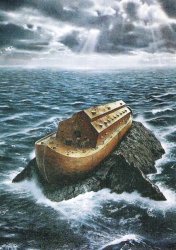
There are many ancient myths from many
different cultures over the world concerning a great flood. However,
this does not have to mean that every myth was talking about the same
disaster. In the Mesopotamiam myths; The "gods"
either created or foresaw the coming flood. The Lord Enlil saw this
happening as an opportunity to undo their creation, which they thought
was huge failure because of the corruption and lawlessness of the people
which started with the interference of the "fallen angels" and the
birth of the giants.
The god Enki (Ea), regarded as a co-creator and protector of mankind,
didn't want to destroy his creation so, despite the agreement of the
gods to let mankind perish, he told a pious man known as Ziusudra
(Sumerian), Utna-pishtim (Old Babylonian), and Noah (both
Babylonian and Hebrew "Book of Genesis") about the coming flood and
instructed him to build a giant wooden ark to save him and his family.
Quoting from Wikipedia:
 "According
to Sumerian mythology, Enki also assisted humanity to survive the
Deluge designed to kill them. In the Legend of Atrahasis, Enlil, the
king of the gods, sets out to eliminate humanity, the noise of whose
mating is offensive to his ears.
"According
to Sumerian mythology, Enki also assisted humanity to survive the
Deluge designed to kill them. In the Legend of Atrahasis, Enlil, the
king of the gods, sets out to eliminate humanity, the noise of whose
mating is offensive to his ears.
He successively sends
drought, famine and plague to eliminate humanity, but Enki thwarts
his half-brother's plans by teaching Atrahasis about irrigation,
granaries and medicine. Humans again proliferate a fourth time.
Enraged, Enlil convenes a Council of Deities and gets them to promise
not to tell humankind that he plans their total annihilation.
Enki
does not tell Atrahasis, but instead tells the walls of Atrahasis'
(a.k.a. Utnapishtim, Ziusudra, Noah) reed hut of Enlil's plan, thus
covertly rescuing Atrahasis by either instructing him to build some
kind of a boat for his family, or by bringing him into the heavens in
a magic boat.
After the seven day Deluge, the flood
hero frees a swallow, a raven and a dove in an effort to find if the
flood waters have receded. On the boat landing, a sacrifice is
organised to the gods. Enlil is angry his will has been thwarted yet
again, and Enki is named as the culprit. As the god of what we would
call ecology, Enki explains that Enlil is unfair to punish the
guiltless Atrahasis for the sins of his fellows, and secures a
promise that the gods will not eliminate humankind if they practice
birth control and live within the means of the natural world.
The
threat is made, however, that if humans do not honor their side of
the covenant the gods will be free to wreak havoc once again. This
is apparently the oldest of the surviving Middle Eastern Deluge
myths."
(Source: Wikipedia)
Instead of Enki, in the first book of Enoch it was the
arch-angel Uriel who warned Noah of the Deluge and instructed him to
build the ark. Could it be that they were the same being, as Enki
became the arch-angel Uriel in his further evolution?
According
to Edgar Cayce, the biblical "Deluge" would have happened
around 22,006 BC. Because of the catastrophe, the Atlantean land land
broke up into three large and two smaller islands. It is not to be
confused with the final demise of Atlantis which happened around
9,900 BC, when the last remaining island of Atlantis (which Plato
actually spoke of) finally disappeared into the Atlantic Ocean. (More
in the chapter about Atlantis:
The Three Catastrophes.)
Like in the Bible, the final
flood of Atlantis had been similarly described as a punishment from
Zeus; the god of the gods, in Plato's dialogue "Critias".
The book: "A Dweller on two Planets" by Phylos the Thibetan and claimed to be channeled through Frederick S. Oliver, described various previous lives of a soul called Phylos, including one where he lived in Atlantis, and he also described some insights from the "Book of Life", which is also known as the "Akashic Records" in New Age terminology. At page 404 of this book, the author wrote that he saw in the Book of Life that the vessel of "Nepth" (apparently Noah), was carried by the great flood from Atlantis into Africa, from where it at finally came to a halt in Asia. (The book "A Dweller on two Planets" is fully readable online at: www.sacred-texts.com.)
Noah's story also bears some similarities with both the Chinese "Fu Xi" (or "Fohi"), who was the very first ruler of China according to Chinese mythology, and "Manu"; known in various Hindu traditions as the progenitor of mankind and the very first king to rule the Earth.



